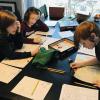
If you enter a library or bookstore in the month of September, chances are you’ll see a Banned Books display. Librarians and booksellers are doing their best to draw you into a hot-button issue: censorship. When we celebrate Banned Books Week (Sept. 18–24), we honor our right to read whatever we want, whenever we want, for whatever reason. Banned Books Week puts a spotlight on stories that have been challenged and banned, allowing us to reflect on our own viewpoints of censorship and to practice critical thinking.
The American Library Association (ALA) recently released its 2021 report for banned and challenged books. The data reflects a kaleidoscope of divisiveness in our current society. In the report, the ALA’s Office for Intellectual Freedom noted 729 challenges of various media, 82 percent related to books, with the remainder split among tv programs, artwork, social media and more. The majority of challenges took place in school libraries, public libraries and schools.
What’s at the heart of these challenges? What makes someone look at a book or other media form and decide to challenge it? Or what about those who go beyond, pushing for bans not just for themselves but for people everywhere?
The power of critical thinking
If I’m going to ask those questions of others, I need to be able to ask them of myself. In the book “Raising Critical Thinkers: A Parent’s Guide to Raising Wise Kids in the Digital Age,” author Julie Bogart writes, “The ability to evaluate evidence, to notice bias as it kicks into gear, to consider a variety of perspectives (even if they make you uncomfortable), and then to render a possible verdict — what you believe to be true, for now — is the heart of the critical thinking task.”
This is no small feat, but if we can stop and think about our bias, we are on the way to fewer book bans and more collaborative discussions. Reading is personal, and the right to do so is universal. When we ban or challenge books due to our own perspectives, fears or beliefs, we run the risk of saying that certain groups of people don’t belong in learning spaces. What we decide for our children and families is one thing, but making those decisions for others is problematic.
When we branch out and read stories from other perspectives, we can participate in active critical thinking. Through conversations, we can expand our perspectives and see that everyone has a story to tell, and everyone deserves to be heard.
Looking for something to read in celebration? Start with one of the top five most challenged books of 2021.
“Gender Queer” by Maia Kobabe
Maia Kobabe, who uses e/em/eir pronouns, first wrote this autobiography covering eir journey of self-discovery as a guide for eir family to detail what it means to be non-binary and asexual.
Reasons: Banned, challenged and restricted for LGBTQIA+ content, and because it was considered to have sexually explicit images.
“Lawn Boy” by Jonathan Evison
Recently fired from his landscaping job and unsure of his future, Mike Muñoz goes on a journey of self-discovery and finds his own version of the American Dream along the way.
Reasons: Banned and challenged for LGBTQIA+ content and because it was considered to be sexually explicit.
“All Boys Aren’t Blue” by George M. Johnson
This young adult memoir written by LGBTQIA+ activist and journalist George M. Johnson details growing up as a Black queer boy in New Jersey and Virginia.
Reasons: Banned and challenged for LGBTQIA+ content, profanity and because it was considered to be sexually explicit.
“Out of Darkness” by Ashley Hope Perez
Set in 1937 in a deeply segregated Texas town, this work of historical fiction tells the story of family, racial issues and romance between Naomi Vargas, who is Mexican American, and Wash Fuller, who is Black.
Reasons: Banned, challenged and restricted for depictions of abuse and because it was considered to be sexually explicit.
“The Hate U Give” by Angie Thomas
When a police officer fatally shoots Starr’s childhood friend Khalil, she becomes the witness to a crime that makes national headlines. What she decides to say will impact her life and community in unimaginable ways.
Reasons: Banned and challenged for profanity and violence, and because it was thought to promote an anti-police message and indoctrination of a social agenda.
Want more? Check out the 10 Most Challenged Books of 2021.
You also might like: |
















